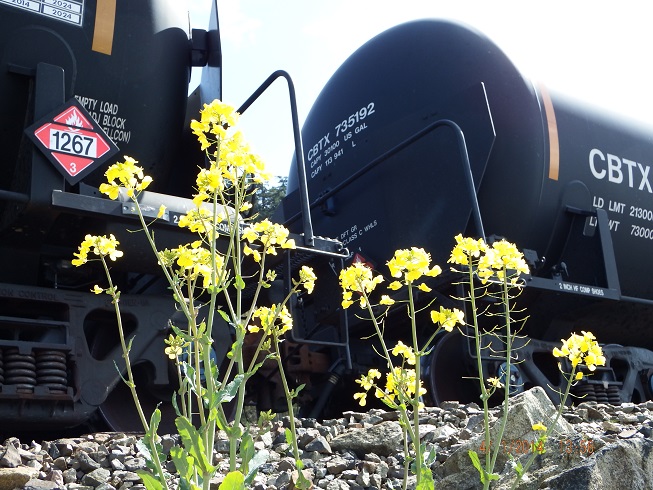By Tim Gould, Chapter Executive & Legislative Committees, and Bruce Wishart, Chapter Legislative Affairs Director
T he 2015 Washington legislative session has been a busy one for Sierra Club staff and activists. This year, Governor Inslee has elevated the issue of climate change by introducing major legislation on carbon pricing, electric cars, and oil transportation safety. Sierra Club has also been a leader on legislation to phase out the Montana Colstrip coal-fired power plant, along with efforts to protect water supplies in rural areas of the state. On top of all that, the Legislature has proposed two different versions of a major transportation revenue package, which could have profound implications on greenhouse gas emissions. Photo: Oil train.
he 2015 Washington legislative session has been a busy one for Sierra Club staff and activists. This year, Governor Inslee has elevated the issue of climate change by introducing major legislation on carbon pricing, electric cars, and oil transportation safety. Sierra Club has also been a leader on legislation to phase out the Montana Colstrip coal-fired power plant, along with efforts to protect water supplies in rural areas of the state. On top of all that, the Legislature has proposed two different versions of a major transportation revenue package, which could have profound implications on greenhouse gas emissions. Photo: Oil train.
The House of Representatives has generally promoted policy positions supported by Sierra Club, while the Senate has fought to derail many important bills on environmental topics. The operating and capital budgets offer more examples of the schism between House and Senate, while the new revenue transportation proposals from both chambers have proven disappointing for the large allocation to new highway projects and short-changing of maintenance and multi-modal funding.
Given this polarization between the House and Senate, many observers expect the important work of approving a new operating budget for the 2015-17 biennium won’t be accomplished by the scheduled end of session April 26. Special sessions could extend past July 1, the start of the new fiscal year.
Climate Change and Oil-By-Rail Are Top Issues
The chapter has worked on climate change legislation throughout the session. The governor’s carbon pricing bill, House Bill 1314, was heard in House committees that drew large numbers of activists and leaders concerned about the need to reduce greenhouse gas emissions in Washington. Unfortunately, this bill was not incorporated into the House operating budget proposal, and its approach was never considered in the Senate. We will evaluate after the session concludes how to advance a carbon pricing plan through possible citizen initiative.
Transport of crude oil-by-rail is also getting a lot of attention, due to a significant number of oil trains that have derailed and caught fire in the past several months. With oil companies and distributors proposing several new oil terminals across the region, the House substituted its strong safety bill in place of the Senate’s less effective one. E2SSB 5057 would, among other things, require that freight railroads invest in safety measures, authorize state inspections, and require safety precautions for marine transportation of oil.
Transportation Funding Legislation: ‘Poison Pill’
Transportation funding is proving to be another contentious issue with several potential trade-offs that affect environmental policies and state budgets. For example, the Senate transportation revenue bill, SB 5987, contains a “poison pill” that would force Governor Inslee to choose between either funding for transit and pedestrian/bike programs or the authority to develop a clean-fuels standard to reduce air pollution from cars.
The Senate revenue bill is also contingent on the passage of a series of policy reforms, which include raiding a toxic clean-up account to pay for transportation mitigation and offering exemptions from the Shorelines Management Act for construction projects. Sierra Club helped to narrow the exemptions to those standards through successful amendments to HB 1850, but the Senate subsequently amended this bill on a party-line vote to replace the offending exemptions. Both the Senate and House proposed new funding is skewed too heavily toward new projects that encourage more sprawl and greenhouse gas emissions, with too little funding dedicated to basic maintenance and transit service improvements.
Water and Growth
Our state’s growing land-use development in rural areas poses a great threat to water supplies and in-stream flows necessary to protect endangered salmon runs. Recent legal decisions have required local governments to better manage growth in areas where water is scarce. A spate of bills introduced in the Senate would have reversed the law on this matter, allowing significant impacts on salmon and existing water users. Sierra Club and allies have been successful in stopping these bills and promoting more sensible water management.
Phase-out of Colstrip Coal Plant
Last but not least, Sierra Club has been involved in sensitive discussions around legislation that may determine the fate of the enormous Colstrip Coal Plant in Montana and investment in the facility by utility company Puget Sound Energy, which obtains about 20 percent of its electric energy from the plant. Sierra Club is promoting efforts to phase out the plant—one of the largest sources of carbon emissions in the United States—and transition to alternative clean sources of energy for our region.
To see up-to-date information about pending legislative bills, please visit the chapter’s website and the state’s legislative bill page.